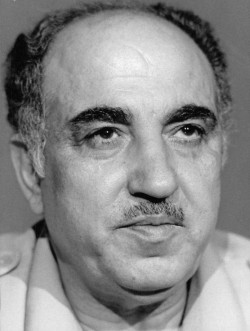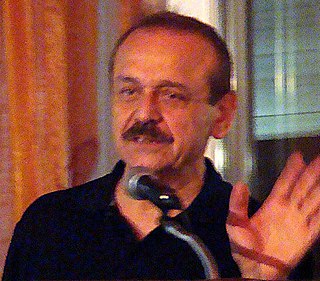The Abu Nidal Organization, officially Fatah – The Revolutionary Council, was a Palestinian militant group founded by Abu Nidal in 1974. It broke away from Fatah, a faction within the Palestine Liberation Organization, following the emergence of a rift between Abu Nidal and Yasser Arafat. The ANO was designated as a terrorist organization by Israel, the United States, the United Kingdom, Canada, the European Union. and Japan. It became inactive in 1997.

Fatah, formerly the Palestinian National Liberation Movement, is a Palestinian nationalist and social democratic political party. It is the largest faction of the confederated multi-party Palestine Liberation Organization (PLO) and the second-largest party in the Palestinian Legislative Council (PLC). Mahmoud Abbas, the President of the Palestinian Authority, is the chairman of Fatah.

The Palestine Liberation Organization is a Palestinian nationalist coalition that is internationally recognized as the official representative of the Palestinian people. Founded in 1964, it initially sought to establish an Arab state over the entire territory of the former Mandatory Palestine, advocating the elimination of the State of Israel. However, in 1993, the PLO recognized Israeli sovereignty with the Oslo I Accord, and now only seeks Arab statehood in the Palestinian territories that have been militarily occupied by Israel since the 1967 Arab–Israeli War.

Yasser Arafat was a Palestinian political leader. He was Chairman of the Palestine Liberation Organization (PLO) from 1969 to 2004 and President of the Palestinian National Authority (PNA) from 1994 to 2004. Ideologically an Arab nationalist and a socialist, Arafat was a founding member of the Fatah political party, which he led from 1959 until 2004.

The Popular Front for the Liberation of Palestine – General Command or PFLP-GC is a Palestinian nationalist militant organisation based in Syria.

Salah Mesbah Khalaf, also known as Abu Iyad, was deputy chief and head of intelligence for the Palestine Liberation Organization and the second most senior official of Fatah after Yasser Arafat.

Khalil Ibrahim al-Wazir was a Palestinian leader and co-founder of the nationalist party Fatah. As a top aide of Palestine Liberation Organization (PLO) Chairman Yasser Arafat, al-Wazir had considerable influence in Fatah's military activities, eventually becoming the commander of Fatah's armed wing al-Assifa.

Faruq al-Qaddumi or Farouk al-Kaddoumi, also known by the kunya Abu al-Lutf, was until 2009 Secretary-General and between 2004 and 2009 Chairman of Fatah's central committee and the Palestine Liberation Organization's political department, operating from Tunisia.

Operation "Wooden Leg" was an Israeli airstrike on the Palestine Liberation Organization (PLO) headquarters in Hammam Chott, near Tunis, Tunisia, on October 1, 1985. With a target 1,280 miles (2,060 km) from the operation's starting point, this was the most distant publicly known action undertaken by the Israel Defense Forces since Operation Entebbe in 1976. On 4 October, the airstrike was condemned by the United Nations Security Council.

Yasser Abed Rabbo also known by his kunya, Abu Bashar is a Palestinian politician and a member of the Palestine Liberation Organization's (PLO) Executive Committee.

The Palestine Liberation Army is ostensibly the military wing of the Palestine Liberation Organization (PLO), set up at the 1964 Arab League summit held in Alexandria, Egypt, with the mission of fighting Israel. However, it has never been under effective PLO control, but rather it has been controlled by its various host governments, usually Syria. Even though it initially operated in several countries, the present-day PLA is only active in Syria and recruits male Palestinian refugees.

Khaled al-Hassan (1928-1994) was an early adviser of Yasser Arafat, PLO leader and a founder of the Palestinian political and militant organization Fatah. Khaled was the older brother of Hani al-Hassan.

Political relations between the State of Palestine and the United States have been complex and strained since the 1960s. While the U.S. does not recognize the State of Palestine, it recognizes the Palestine Liberation Organization (PLO) as the legitimate representative entity for the Palestinian people; following the Oslo Accords, it recognized the Palestinian National Authority as the legitimate Palestinian government of the Palestinian territories.

The Palestinian insurgency in South Lebanon was a multi-sided armed conflict initiated by Palestinian militants against Israel in 1968 and against Lebanese Christian militias in the mid-1970s. It served as a major catalyst for the outbreak of the Lebanese Civil War in 1975. Fighting between the Palestinians and the Christian militias lasted until the Israeli invasion of Lebanon in 1982, which led to the expulsion of the Palestine Liberation Organization (PLO) from Lebanese territory. While the PLO relocated to Tunisia in the aftermath of Israel's invasion, other Palestinian militant factions, such as the Syria-based PFLP–GC, continued to carry out low-level operations from Syrian-occupied Lebanon. After 1982, the insurgency is considered to have faded in light of the inter-Lebanese Mountain War and the Israel–Hezbollah conflict, the latter of which took place for the duration of the Israeli occupation of South Lebanon.

The Chairman of the Palestine Liberation Organization, officially the Chairman of the Executive Committee of the Palestine Liberation Organization, is the leader of the Executive Committee (EC) of the Palestine Liberation Organization (PLO), the executive body of the PLO, which was established in 1964. The Chairman represents the PLO and the Palestinian people before the international community, including the United Nations. The Chairman is chosen by the members of the PLO EC. Since 29 October 2004, Mahmoud Abbas has been the Chairman of the PLO EC.

During the 1982 Lebanon War, the city of Beirut was besieged by Israel following the breakdown of the ceasefire that had been imposed by the United Nations amidst the Lebanese Civil War. Beginning in mid-June, the two-month-long siege resulted in the expulsion of the Palestinian Liberation Organization (PLO) from Beirut and the rest of Lebanon.
Kamal Abdel Hafiz Adwan, also spelt as Kamal Udwan, was a Palestinian politician and one of the top leaders in the Palestinian Liberation Organization. He was killed during a 1973 Israeli raid in Lebanon.

Israel–Libya relations describes the relations between Israel and Libya. While there have been no formal diplomatic agreements between Israel and Libya since Libya's independence, there have been some notable events and developments in their relationship over the years. One of the main reasons for Libya's antagonism towards Israel has been its support for the Palestinian cause. Libya, under the rule of Muammar Gaddafi, was a staunch supporter of the Palestinian cause and provided aid and support to various Palestinian militant groups.
The Battle of Tripoli was a major battle during the middle of the Lebanese Civil War in late 1983. It took place in the northern coastal city of Tripoli between pro-Syrian Palestinian militant factions and the Palestine Liberation Organization (PLO) led by Yassir Arafat. It resulted in the withdrawal of PLO and mostly ended their involvement in the war.

















